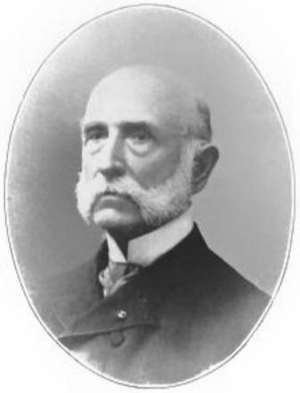Lewis B. Parsons Jr. facts for kids
Quick facts for kids
Lewis B. Parsons Jr.
|
|
|---|---|
 |
|
| Born | April 5, 1818 Perry, New York
|
| Died | March 16, 1907 (aged 88) Flora, Illinois
|
| Resting place | Bellefontaine Cemetery |
| Education | |
| Occupation | Banker, lawyer, military officer |
Lewis Baldwin Parsons Jr. (born April 5, 1818 – died March 16, 1907) was an important officer in the Union Army during the American Civil War. He was one of the last people to be promoted to brigadier general of volunteers during the war.
Contents
Early Life and Career of Lewis Parsons
Lewis B. Parsons Jr. was born in Perry, New York, on April 5, 1818. A college called Parsons College was named after his father, Lewis B. Parsons Sr. His grandfather, Charles Parsons, was also a military officer during the American Revolutionary War.
Lewis Parsons Jr. was a very smart student. He graduated from Yale College in 1840. After that, he worked as a teacher for a while. He then went on to study law and graduated from Harvard Law School in 1844. He started his law career in Alton, Illinois. Later, in 1854, he moved to St. Louis, Missouri. There, he became the president of a railroad company called the Ohio and Mississippi Railway.
Lewis Parsons' Role in the Civil War
Parsons began his military service on October 31, 1861. He started as a captain and an assistant quartermaster. A quartermaster is an officer who makes sure the army has all the supplies it needs. This includes food, clothing, equipment, and transportation.
In 1861, he worked as an aide-de-camp for Brigadier General Francis Preston Blair, Jr. An aide-de-camp is like a personal assistant to a high-ranking officer. From December 1861 to March 1862, Parsons was in charge of all rail and river transport in the Department of the Missouri. This was a big job, making sure supplies and troops moved where they needed to go.
He was promoted to colonel in the Regular Army in February 1862. He also became an aide-de-camp to Major General Henry Halleck. Parsons continued to manage rail and river transport in different military areas. He worked in the Department of Mississippi from March to September 1862.
Later, he was an aide-de-camp to Major General Samuel Ryan Curtis starting in September 1862. He then took charge of transport for the Army of the Tennessee until December 1863. He also served as an aide-de-camp to Major General John M. Schofield in July 1863. From December 1863 to August 1864, Parsons was in charge of all rail and river transport for the entire Military Division of the Mississippi. This was a huge responsibility, helping to move armies and supplies across a vast area.
In August 1864, Parsons was appointed Colonel and Quartermaster. He continued to manage river and rail transport in the Department of the Ohio from January 1865 until April 1866.
On May 11, 1865, President of the United States Andrew Johnson promoted Parsons to brigadier general of volunteers. This promotion was officially confirmed by the United States Senate in February 1866. Parsons left the volunteer army on April 30, 1866.
Later Life and Passing
After the Civil War ended, Lewis B. Parsons Jr. moved to Flora, Illinois. There, he became a banker. He passed away on March 16, 1907, in Flora, Illinois. He was buried at Bellefontaine Cemetery in St. Louis, Missouri.
Lewis Parsons' Lasting Impact
Lewis Parsons' work during the Civil War was very important. As an officer in the army's quartermaster corps, he helped set up a strong system for military railroads in the western parts of the country.
His efforts were huge, especially from late 1862 until the war ended. He helped provide transportation for General Ulysses S. Grant's important battles at Fort Donelson and Fort Henry in 1862. Parsons created an organized way for the United States Military Railroads to operate smoothly in 1864 and 1865. His work made it possible for the Union Army to move troops and supplies effectively, which was key to their success.

